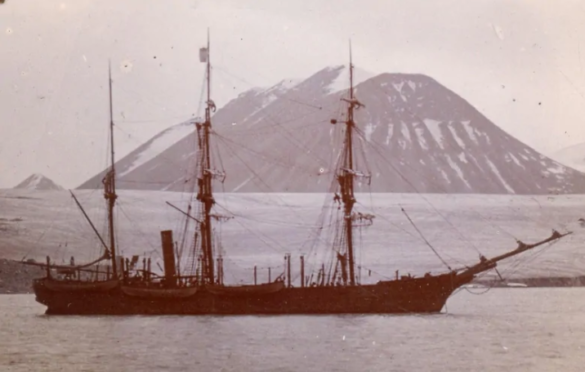A Dundee whaling ship wrecked in the icy waters of the Arctic has been found after more than a century underwater.
The “ill-fated” Nova Zembla, which sank in 1902, has been found by researchers from Calgary, Canada.
More than 200 ships from British whaling fleets are thought to have perished in the Canadian Arctic and the wreck of the Nova Zembla is the first of these to be discovered.
Using a drone, a dinghy and with only an eight-hour window, Matthew Ayre and Michael Moloney located the wreckage and wood from the ship’s mast still strewn across a beach.
Wood from the vessel is likely to have lain untouched on the beach for 116 years, such is the remoteness of the area.
Mr Ayre, a climate historian, and Mr Moloney, an underwater archaeologist, are post-doctoral researchers with the University of Calgary’s Arctic Institute of North America.
Due to the nature of the North Atlantic, the researchers were given only an eight hour window to search the site for wreckage.
The scientists first came across the idea of searching for the vessel after coming across an old shipping log from 1903, which detailed the wreck which had happened the year before.
Mr Moloney told the Canadian Broadcast Corporation (CBC): “It survived storms, and that area ices over every year.
“The thing is, it’s so remote that it’s probably been washed up and sitting on the beach for 116 years — and no one’s ever come across it because that’s the nature of the Arctic.”
On November 3 1902, The Courier reported the crew and cargo of the Nova Zembla had been rescued by other ships, after striking a reef during a storm in the Davis Straits on September 18 of that year.
The report read: “Great storms have raged in the far north and as a result of one of these the Nova Zembla – one of the five vessels which formed the Dundee Whaling Fleet – ran aground on the evening of September 18 and became a total wreck.
“This occurred about a mile to the south of Dexterity fjord, which is on the west side of the Davis straits.
>> Keep up to date with the latest news with The Courier newsletter
“Fortunately no lives were lost, but many of the crew had narrow escapes, and their adventures read like a romance.
“In fact, had it not been for the assistance obtained by the Diana and the Eclipse, who were only about six miles from the scene of the wreck, every man on board the ill-fated Nova Zembla must have perished.”
A report the following day updated the city, which said: “A boat was sent once to the ill-fated ship (the Nova Zembla).
“It was thought at first that she had been abandoned, but boarding the vessel the captain, mate, and chief engineer were still standing by.
“The crew had got ashore in the boats, but had been unable to return.
“The ship was doomed, but the Diana’s crew risked much in rescuing the whalebone secured by the unfortunate whaler. Much difficulty attended the task, but it was ultimately all hooked from the hold and transferred to the Diana.”
Despite being lost, because of the actions of the other ships the crew was still able to turn a profit, after selling the single black whale it had caught days before.











